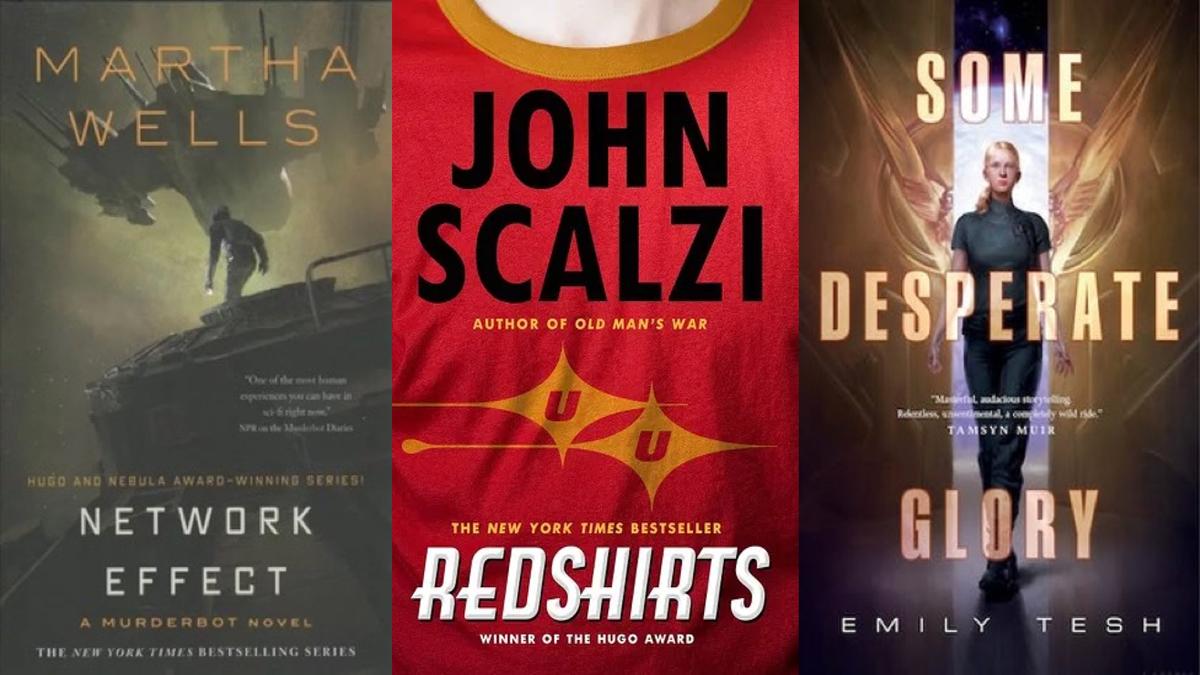
Hugo strikes again! What are they feeding this guy that he has such good taste? Since the mid 20th century, the Hugo Award has been awarded to the cream of the crop of science fiction and fantasy novels. As you can imagine, there are some heavy hitters on this list – leading lights of the genre that proved to be time tested works. While times have changed since 1953 when the Hugo Award was first awarded, the quality of the novels in consideration for it has held strong across the decades. There are 10 Hugo Award wining sci-fi books you need to read. If you don’t, Hugo will be sad.
Some Desperate Glory
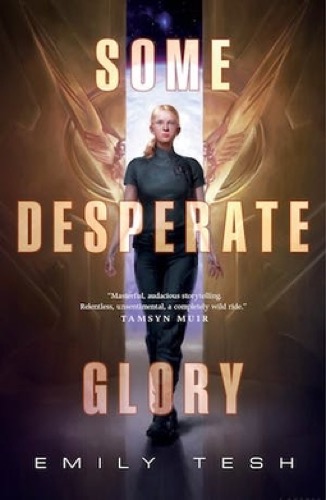
The winner of the 2024, Some Desperate Glory by Emily Tesh is the story of humanity’s ghost, rendered a shell of its former self after a war with the extraterrestrial majo claimed fourteen billion lives. The story takes place on Gaea Station, one of the last remaining human separatist holdouts in existence. Despite excelling in combat, Valkyrie aka“Kyr” is assigned to a breeding role in the station’s utilitarian society – tasked with birthing future soldiers. Yeah, that’s not gonna fly. After learning her brother was assigned to take part in a suicide mission against the majo, Kyr decides to defy orders and join the fight. Part hardcore military sci-fi, part queer feminist love story, Some Desperate Glory is a novel you desperately need to read.
A Desolation Called Peace
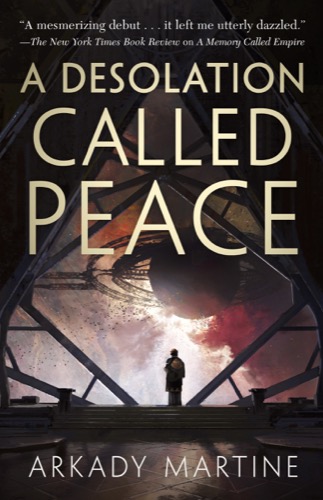
The sequel to Arkady Martine’s A Memory Called Empire and the 2022 Hugo Award winner, A Desolation Called Peace is the story of Ambassador Mahit Dzmare, a diplomat from an independent mining station assigned to negotiate with the star-spanning Teixcalaanli Empire. After successfully overcoming the political foibles of the first novel, Mahit is once again thrown into crisis after a Teixcalaanli colony is attacked by a hostile alien intelligence. As inscrutable as they are aggressive, these aliens will prove to be Mahit’s biggest challenge yet. How do you negotiate with a species whose language you don’t speak, whose goals you don’t understand, and whose minds you can’t comprehend? Mahit better come up with an answer, a bajillion lives depend on it.
Network Effect
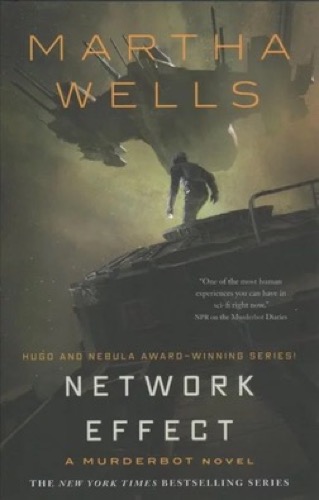
The 2021 Hugo Award Winner, Martha Wells’ Network Effect is the fifth addition to the glorious Murderbot Diaries series. Named after its cyborg protagonist, The Murderbot Diaries are a chronicle of one robotic misanthrope’s struggle to fit in. I recommend beginning the series with its first book All Systems Red, and letting Network Effect be the novel that you look forward to. It’s the story of Murderbot, who, when not binging soap operas, spends its time providing security to human research expeditions – which tend to go disastrously wrong. In this novel, Murderbot and co. are set upon by a raiding force of grey-skinned humanoids that appear to be mysteriously connected by a nearby human colony. If the team can avoid getting killed, they might be able to stop a deadly alien plague that is spreading through the stars. Though the void of space has its thrills, Murdebot’s inner world remains the most compelling part of the story, as always.
Redshirts
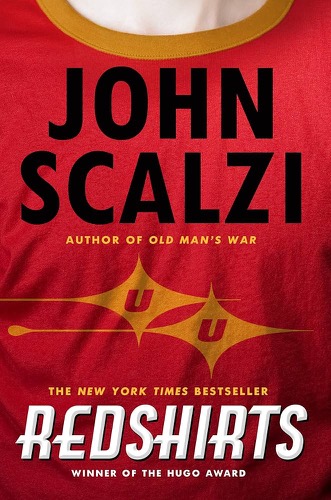
The 2013 Hugo Award Winner, John Scalzi’s Redshirts is the story of a Star Trek-esque crew and their attempt to figure out why their low-ranked members live suspiciously short lives. The higher-ups of the spaceship Intrepid have come up with a few explanations, which include incompetence, supernatural curses, and plain old bad luck. The wildest theory? The crew are characters in a T.V. show, and the writers’ room is running out of ideas. Spoiler alert: that theory is right. A meta sci-fi story, Redshirts is a satire of the pulpy drama and whacky plots for which the genre is known. It’s irreverent, hilarious, and deeply existential. If you knew your life was in the hands of the creators of a poorly written television series, you’d find everything pretty absurd too.
The Calculating Stars
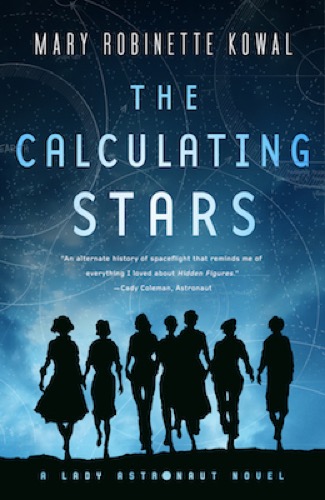
The 2019 Hugo Award winner, Mary Robinette Kowal’s The Calculating Stars is an alternate history of the United States spaceflight program. After a meteorite wipes out part of the Eastern Seaboard and the United States government with it, mathematician and pilot Elma York predicts that world’s woes are far from over. In response to her grim reports about climate change, the surviving members of the U.S. government and the U.N. decide to form the International Aerospace Coalition – a program to build human colonies in space. After the organization fails to select a single woman to serve as an astronaut, Elma and her colleagues begin to publicly challenge the IAC’s decision. A feminist work of sci-fi, The Calculating Stars is the story of a woman working to overcome the prejudices of mid century American, and take to stars above.
Spin

The 2006 Hugo Award winner, Robert Charles Wilson’s Spin fully traumatized me as a child. The story begins with a group of children looking up at the stars – only to watch them go out one by one. As satellites fall out of the sky, scientists are horrified to discover that our planet has been enfolded within a “spin membrane” – a dark shroud that is sending Earth careening into the far future. For every second that passes within the membrane, 3.17 years pass in the universe beyond. After one Earth year, 100 million years will have passed. In a few decades, Earth will be scorched to a crisp by the expanding Sun. Naturally, humanity isn’t taking the news well. Some devote their lives to solving the problem, some join growing doomsday cults, and some live out their days in quiet denial. Given the circumstances, I can’t say I blame any of them.
The Three-Body Problem

The 2015 Hugo Award winner, Cixin Liu’s The Three-Body Problem is becoming a genre classic in real time. Recently adapted into a sprawling Netflix series, Liu’s novel takes its title from a conundrum that has plagued physicists for centuries. When three or more celestial bodies are in orbit around one another, their movements become nearly impossible to predict. When you’re an alien civilization whose survival depends on predicting the movements of the three suns your planet orbits, the Three-Body Problem demands an immediate solution. When that solution becomes “colonize planet Earth,” humanity is confronted with a problem of its own: a full scale alien invasion. A diamond hard science fiction story based in real physics, this novel sparkles equally as bright.
Where Late The Sweet Birds Sang
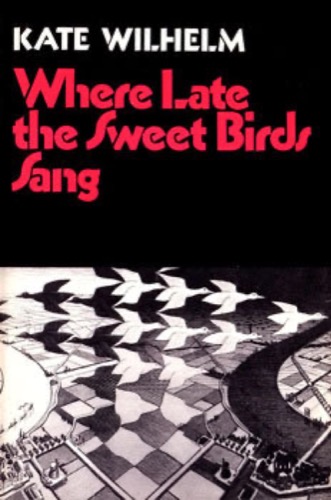
The winner of the 1977 Hugo Award, Kate Wilhelm’s Where Late The Sweet Birds Sang is a post apocalyptic novel set in the remnants of a war-torn world. Rocked by nuclear conflict and disease, humanity has been rendered completely infertile and is slowly dying out. A small group of scientists have managed to establish a community near Virginia’s Shenandoah River, and are staving off oblivion through the use of human cloning. As the clones come of age, their creators are horrified to learn that the clones have no desire to reproduce sexually, and would rather just keep right on cloning. As the decades pass away and un-cloned humanity with them, the clones reshape the world in their own homogenous image. It’s a fascinating speculative fiction story about a group of people almost but not quite like us, engineered to survive in an era that spelled our doom.
The Left Hand of Darkness

The 1970 Hugo Award winner, Ursula K. Le Guin’s The Left Hand of Darkness challenged the gender binary with an intellectual fervor never before seen in the sci-fi genre. The novel follows Genly Ai, a diplomat from an interstellar human federation sent to make contact with the ice world of Gethen. The people of Gethen are ambisexual, only taking on sexual characteristics during a brief monthly mating period called “kemmer.” As a result, human concepts such as “war” simply don’t exist on Gethen – rendering the society to be entirely alien in Genly’s eyes. Genly’s misunderstanding of Gethen’s people combined with their mistrust of outsiders causes him to become a pariah, and he and a disgraced Gethen politician must rely on one another to survive the dangers of the planet’s political and literal climate. Part political thriller, part wilderness survival epic, part treatise on gender, The Left Hand of Darkness is one of the most important works of sci-fi ever penned.
Stand on Zanzibar
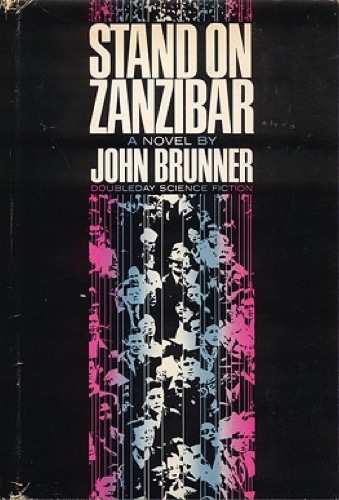
The winner of the 1969 Hugo Award, Stand on Zanzibar by John Brunner feels like it was written within the last ten years. Set in 2010, Brunner painted a disturbingly accurate picture of 21st century social problems – including rising wealth inequality, media saturation, and mass shootings. Centered around a broad cast of characters, this novel examines the cumulative effects of overpopulation on a world that can barely take care of most of its residents already. Corporate executives, government assassins, rival popes, lone wolf revolutionaries, this novel is populated with all types, and its narrative jumps between characters to weave together a tapestry of dystopia. It’s a grimly fascinating read, a sci-fi epic from another era that holds the mirror to our own.
Have a tip we should know? [email protected]







